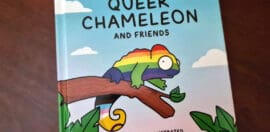Doco of the month: Ghosthunter

18 April 2019 at 8:51 am
The team behind the award-winning documentary Ghosthunter talk to Wendy Williams about the film’s impact and how a story about ghosts became an exploration of the impact of childhood trauma, as part of a new series profiling powerful documentaries in partnership with Documentary Australia Foundation.
The first ghost Jason King ever saw was his brother’s.
King only found out he had a brother when he was 18, but they quickly formed a close bond. The pair wanted to find out if they had the same dad. But then King’s older brother Peter was killed in a car accident, leaving King alone to solve the mystery.
“I want to get rid of that mystery once and for all,” King says.
This is the backdrop for the documentary which follows western Sydney security guard and part-time ghost hunter, King, as he searches for his absent father.
But while director Ben Lawrence, who found King through an article in the local paper about his ghost hunting hobby, may have set out to explore the effects of grief and people’s relationship with the paranormal, “it turned into something entirely different”.
As the story unfolds – over a seven-year time period – King’s search for answers converges with a police investigation, bringing to light a decades-old family secret and forcing him to confront a brutal past.
King, who has no memories of his childhood, explains, “I got told to look up the hospital records, that’s when my nightmares started all over again”.
In the film, you see photos of King as little blond boy smiling through broken teeth.

The records tell of a violent childhood; of a “clumsy kid” who suffered countless head injuries and at one point smashed his palate so badly he required an emergency blood transfusion. His scars caused the kids at school to call him Frankenstein.
The story takes yet another dark turn when King receives a text from Cathy Quinlan, who knew him when he was a child.
After wanting to know if he remembers her. Quinlan later explains that she is also looking for King’s father, who sexually abused her.
The audience watches King struggle to come to terms with the sins of his father.
Much more than a snapshot of sexual assault, the film offers an in-depth and frequently confronting picture of the longterm effects of trauma.
In the process it has become a vehicle to educate students, social workers, police and those working in the criminal justice system about neglect and traumatic memory.
Lawrence says it wasn’t until several years into filming, when the team met with Good Pitch – which bring together filmmakers with NGOs, philanthropists, social entrepreneurs, corporate partners and media – that they became aware of the impact the film could have.
Impact producer Jackie Turnure says they initially didn’t consider themselves “a Good Pitch film”, such as Blue, Dying to Live and That Sugar Film, which all had clear calls to action.
“I remember having discussions saying ‘Are we really a Good Pitch film?’ because the intention to make the film wasn’t ‘let’s make a film to support adult survivors of childhood trauma’ and yet that’s what the film became,” Turnure explains.
“When we first started we thought it might be useful for the survivors of any kind of childhood trauma to see themselves on screen, but what became quickly apparent… [was] it is an incredible ‘Good Pitch film’ for the professionals working in the sector.
“That’s really when we understood the power of the film.”
In Australia, childhood trauma affects 5 million adults – or one in four.
Survivors of childhood sexual abuse often do not disclose their abuse until adulthood.
Turnure says Ghosthunter, which was released in September 2018, has proven to be an “incredibly useful” longitudinal case study for people working with adult survivors.
“People that work with people who have complex childhood trauma, don’t really have many films or many ways to show what it’s like for someone who has grown up in a home of violence and neglect and sexual child abuse and how that plays out over a life,” she says.
Producer Rebecca Bennett says there is also an element of people being exposed to topics that they may not necessarily choose to watch.
“If you’re going to go and see That Sugar Film you know that you’re going to go and watch a film about sugar and you choose to do that, and there are certain types of audiences [for that],” Bennett explains.
“Whereas we came to understand the benefit of making a film that’s in a style that’s kind of mystery noir-ish and allows you to be exposed to these issues, without overtly deciding to go and watch a film about child trauma.”

Described in the trailer as a “haunting real life mystery”, Ghosthunter lives up to that description.
The story continues to offers twists and turns until the very end, with late revelations about King dividing the audience.
Details emerge about King’s violence towards his partners, and we see Lawrence step into the film to confront King about an AVO, a decision he says was really challenging.
“It was quite late in the process, and when I say that it was probably six years into the seven year process, that we became aware of what was going on behind the scenes with Jason and some of his partners,” Lawrence explains.
“It was a difficult decision to approach Jason in regard to portraying it in the film and how important that was. And it really came down to the idea that if we didn’t portray it, someone else was going to discuss it later and we wouldn’t have any way or recourse to explain or understand it then in the context of Jason’s childhood.”
The team also felt they owed it to King’s partners, who while they chose not to speak on camera, needed their story airing, to respect what they had been through.
But the duty of care to King was paramount and involved months of discussion and a “slowly, slowly approach”.
“We were dealing primarily with Jason as a vulnerable individual and we knew his history of suicide attempts. So that was huge,” he says.
“Periods of months and weeks would go by while we were working things out and trying to talk with Jason and others and earning their trust. And without that time we really couldn’t have done their story justice which was the ultimate aim.”
Bennett says without the support of Good Pitch and the Shark Island Institute they would have struggled.
“Obviously we’re not psychologists, we’re not specialists in trauma, we were learning about how Jason reacted the way he did and questioning our own judgment of him and all those kind of things. So having the support of the partners at Good Pitch and everyone at Shark Island was amazing. If we felt really stuck we could call them and they could put us in touch with people who were relevant,” she says.
“The other thing to consider is the duty of care to the crew. There was a lot of pressure and responsibility on Ben as Jason’s lifeline and friend, and as the filmmaker. So being very concerned about Jason and Cathy and their mental health, but also trying to maintain our own mental health, was really tricky.”
Turnure says while there was a lot of discussion about the decision to include Lawrence on film, it proved to be a standout moment for the impact campaign because of the bystander complex.
“In particular we know men often struggle to confront their mates or bring up those tough conversations, and a lot of the organisations we’ve worked with have said what an amazing job Ben did,” she says.
“Ben is not a psychologist, but he did it in such a sensitive and positive way and it was such a hard thing to do. Even though I know Ben didn’t love the idea of suddenly being in the film, I think it actually ended up being one of the most important parts of the story from an impact point of view.”
The aim of the impact campaign is to support adult survivors of childhood trauma, by building capacity within the sector and creating awareness of the issue.
The focus for this year is on education and training, with an educational version of the film set to launch on Kanopy, along with a robust screening guide that the team wrote with the Blue Knot Foundation.
The team is also running four training modules with consultants which will include a longer version of Quinlan’s story, a focus on men confronting men, neglect and, resilience and recovery, with four twenty five minute films cut from the rushes.
The aim for next year is to “switch gears” to a more public facing campaign.
“And so the focus will be on recovery and resilience and celebrating the incredible capacity of humans to overcome the kind of adversity that Jason and Cathy do,” Turnure says.

Lawrence says his hope is that people leave the film with a better understanding of how complex the issue is and “how much grey there is in it”.
“I think if we have an audience member who walks out having that realisation, the film has done its job,” he says.
The team agree the film could become more relevant as public conversation around trauma and how society deals with perpetrators, progresses.
Ghosthunter was released at an interesting time, coinciding with the royal commission, the fallout of the Me Too movement and a number of high profile abuse cases in the public eye including Michael Jackson, R Kelly and Cardinal George Pell.
Against this, the focus on King, as a perpetrator of domestic abuse, has been polarising, with the film being better received in Europe than in North America, where the Me Too movement was reaching its peak.
Lawrence explains while on the one hand the film was embraced as a survivor film, it was difficult for some people to see someone like King at the center of the story.
“The film seemed to hit the mark in terms of what people were talking about but because the central character had done what he’d done, I think some people found it didn’t sit right with them. So it was a kind of a meeting of those two points of view,” Lawrence explains.
Bennett says despite the challenging nature of the subject matter, the documentary is not all “doom and gloom”.
“We hope that you leave the film with some form of hope. For Jason and his ability to survive and his ability to, as he says, ‘get up and keep on going’, and his ability to look for love,” she says.
“It’s a film about survival and strength.”
Lawrence says the film is a testimony to the resilience of King, Quinlan and the other survivors.
“Without hope they wouldn’t have survived to this point,” he says.
“I encourage people to go and experience the film for that reason, because it does celebrate that aspect. While it’s very dark, it is a testimony to what people are able to endure and still maintain a positive outlook.”
Ghosthunter is available to watch on iTunes or on DVD at JB-HI FI. It will also be screened on SBS later this year.
Each month Pro Bono Australia and Documentary Australia Foundation present a Doco of the Month, profiling powerful documentaries with social impact at their heart.
Documentary Australia Foundation is Australia’s only not-for-profit organisation that fosters social change through documentary storytelling.
If you need support, please call the Blue Knot Helpline on 1300 657 380 (9am-5pm AEST, 7 days) to speak with one of their trauma counsellors.








